Ghost Channels 80s Arena Rock & Universal Sentiments on “Skeletá”
Their most introspective record to date
Sustaining an ongoing 15-year professional career is a challenge for most modern bands. In recent years Ghost has succeeded to the highest degree. Their last album, Impera, met with critical acclaim and raised the group to arena-filling status. Due in part to the song trending on TikTok, “Mary on a Cross” became the Swedish group's first Platinum-certified American single.
Their theatrical live shows became immortalized on film with the release of the Rite Here Rite Now concert film. Notching career milestones like these hasn't incentivized Ghost’s mastermind and leader Tobias Forge, to savor his victories and halt his group's ongoing evolution. Ghost is on an uphill climb and refuses to slow down.
Aside from their discography, Ghost’s foundation is rooted in theatrics. The group parodies the Catholic church with the focal point of worshipping Satan instead of God. Forge assumes the frontman role, depicting a demonic pope that gets rotated throughout every album cycle (Papa Emeritus I, II, et al), backed by an anonymous group of musicians known as Nameless Ghouls. The different personas and other fictional characters, best explained in their “Chapters” web series on YouTube, fuel the band’s lore and set the group apart with their ability to transcend different forms of multimedia.
This new album cycle is coincidental with Pope Leo XIV taking over the Catholic Church, because the newly appointed Papa V Perpetua fronts the band on Ghost’s new album, Skeletá.
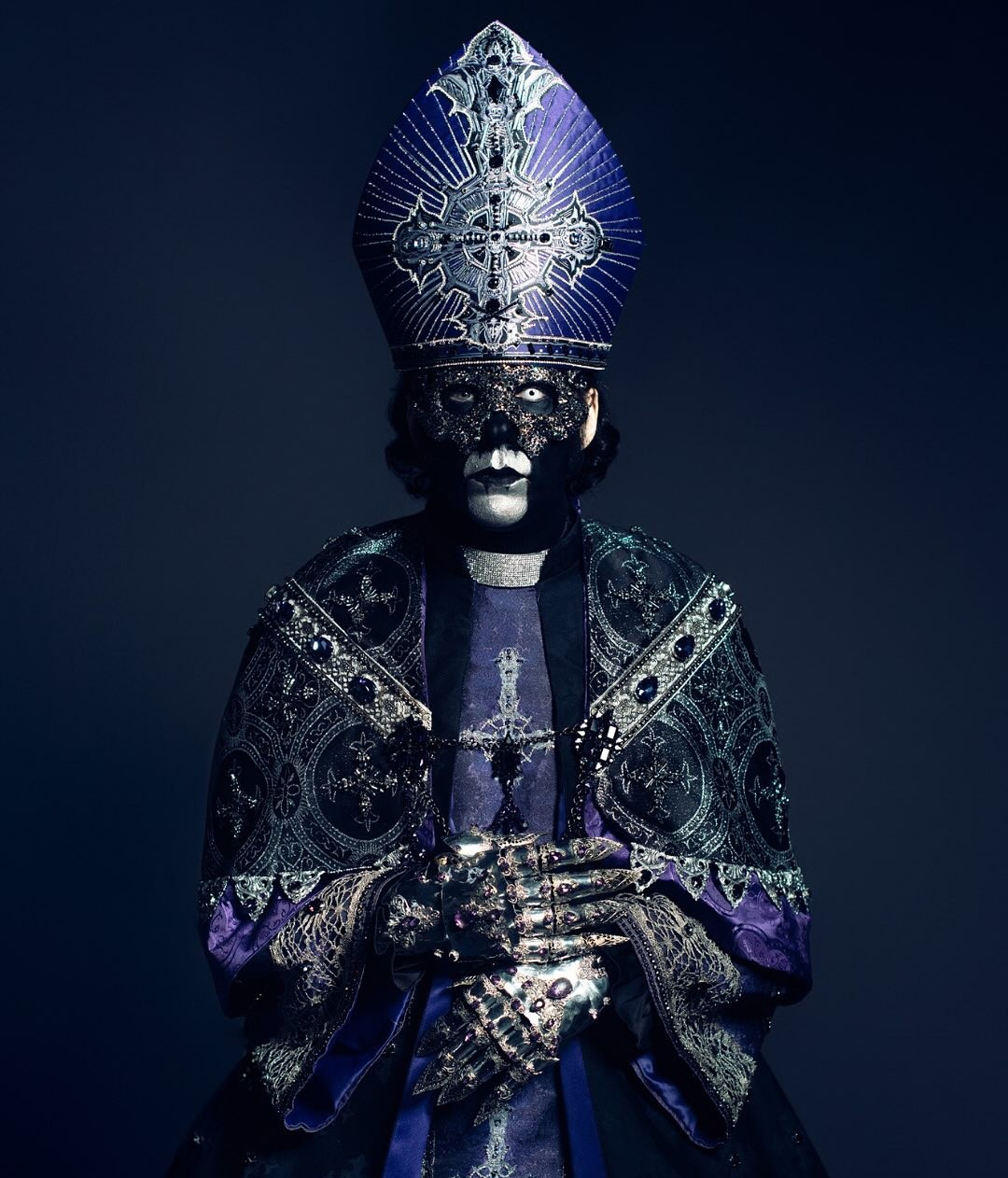
For Skeletá, Tobias Forge teamed up again with the songwriting team of Salem Al Fakir, Vincent Pontare, and Max Grahn, who were responsible for crafting the material heard on Impera. Since Ghost’s inception, the group has been in a tug of war among metal listenerse; elitists often shunning the band from being associated with the genre. What makes Ghost fascinating is that their sound doesn’t match their image. At first glance, you’d expect guttural vocals and bleak instrumental overtones. The heaviness comes in plentifully with influences ranging from Black Sabbath to Iron Maiden. Yet, the accessible element comes from the pop sensibilities of ABBA (the group is Swedish after all!). In turn, the last few Ghost albums have resided in 1980s-tinged arena rock territory that easily would’ve rivalled Bon Jovi or Def Leppard if it were released then. Some call it an exercise in nostalgia, but it proves Forge and company’s intent on crafting records packed with infectiously melodic hooks that become instant ear candy.
Skeletá opens with “Peacefield,” its introduction graced by a beautiful hymn-like introduction with a choir and organ accompaniment. When the guitars and full band enter, it transforms into an anthem with a chorus that resembles Journey’s “Separate Ways (Worlds Apart).” Lyrically, it starts the album with a very optimistic message of hope amidst very tempestuous times. The following track, “Lachryma,” contains all the trademarks one would expect from a Ghost track and comes cleverly arranged, with the dark lyrical tone of self-deprecation complementing the heavy riff-centered verses and moments of grace in the melodic choruses, not to mention a harmonized lead guitar solo to boot!
Some of the blatant satanic imagery in Ghost’s recent material appears watered down and not so directly referenced. Instead, it serves as a template to focus on universal concepts. The aptly titled “Satanized” seems superstitious on the surface, but it shows how the idea of being in love can possess someone like a demon. The pacing slows with “Guiding Lights,” a traditional hard rock ballad about personal forbearance that sounds like it would come to life in an arena full of swaying lighters and cellphone lights. A sombre piano interlude leads into “De Profundis Borealis.” The tremolo-picked riffs, galloping rhythm, and lyrics about regret that mention ice and frost tie into the black metal ethos, yet the song doesn’t sound close to it since it’s reformatted to fit within the Ghost mold.
Flipping the record to Side B, the second half of Skeletá starts by using profound arrangement contrasts. “Cenotaph” and its meaning, an empty grave, make for striking symbolism of a deceased one remaining spiritually in someone’s consciousness. This heavy subject matter is more empowering when backed by an uplifting musical accompaniment; the syncopated lead guitar and synthesizers are a sonic treat! “Missilia Amori” is packed with plenty of metaphors, cleverly like most of KISS’ lyrics, that weaponize a love that’s turned toxic. Unintentionally, the song has a seductive connotation that sounds like it could come blaring from a gentleman’s club. Beyond their physical presentation, Ghost’s theatrical element musically shines on “Marks of the Evil One.” The keyboards that double the vocal melody and the instantly memorable “There! There!” motif give the song sensational character. Outside of satanic themes, Ghost doesn’t fret on embodying darker biblical themes, such as, on this track, the Four Horsemen of the Apocalypse from the Book of Revelation.
A steady cowbell and ominous vocals drive the urgency of the lustful “Umbra.” The instrumental break of organ and guitar trade-offs isn’t just the track’s highlight, but is bound to become a stage staple for the Nameless Ghouls to flaunt their instrumental skill. Like other Ghost albums, “Excelsis” concludes Skeletá in an obligatory melodramatic fashion. The clean guitar tones and choir lift the track’s angelic nature, and the bridge packs in all the pomp and circumstance found on the mother of all power ballads, Guns N’ Roses’ “November Rain.” Its lyrical sentiment regarding the inevitability of death and the desire to continuously enjoy life while it's in front of you is a profoundly deep message to wrap up the album on.
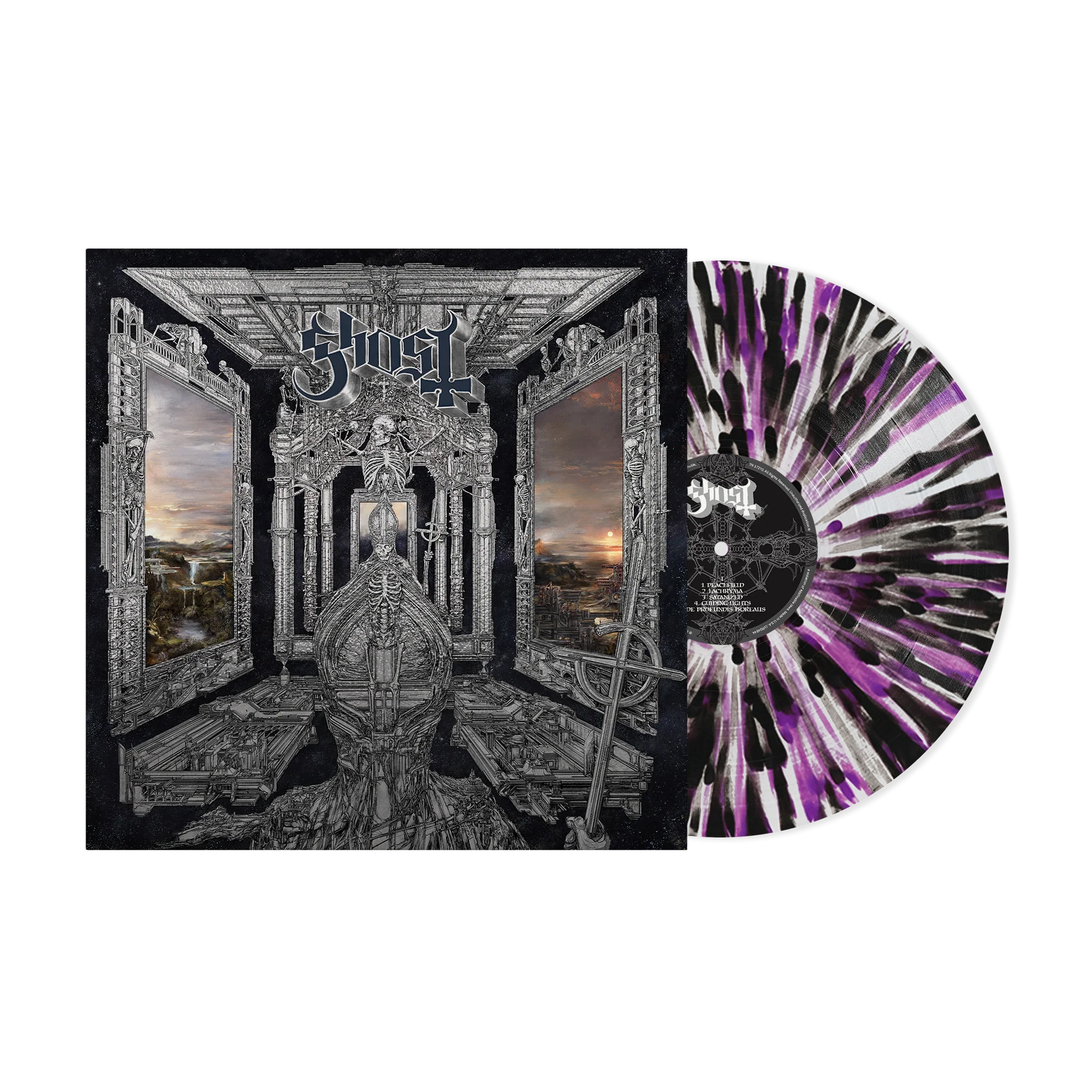
Much like Derek Riggs was to Iron Maiden or Roger Dean to Yes, since 2013 Zbigniew M. Bielak’s work has graced almost all of Ghost’s studio album covers. The concept behind Skeletá’s cover can tie into the final lyric of “Excelsis,” stating, “I am afraid of eternity too.” It features Papa staring into galactic mirrors of eternity, borders decorated intricately with skeletons, and portraits of dusk and dawn on the opposing sides. Bielak’s intricate work is stunning, and the album’s silver foil jacket makes it more effective to marvel at. The galactic themes run throughout the album’s back cover, with the tracklist appearing on what looks like a throne within the Death Star in Star Wars. Adding an element of fun to the packaging, vinyl pressings come with a plastic overlay of Papa V Perpetua as if he’s sitting on the throne. Consumers can have a fun time placing the overlay on other album covers to see if it flawlessly matches up! A printed inner sleeve features a band photo and lyrics printed in metallic ink, and my reference copy for this review, the Loma Vista webstore exclusive, is hand-pressed on a gorgeous piece of clear with black and purple splatter vinyl.
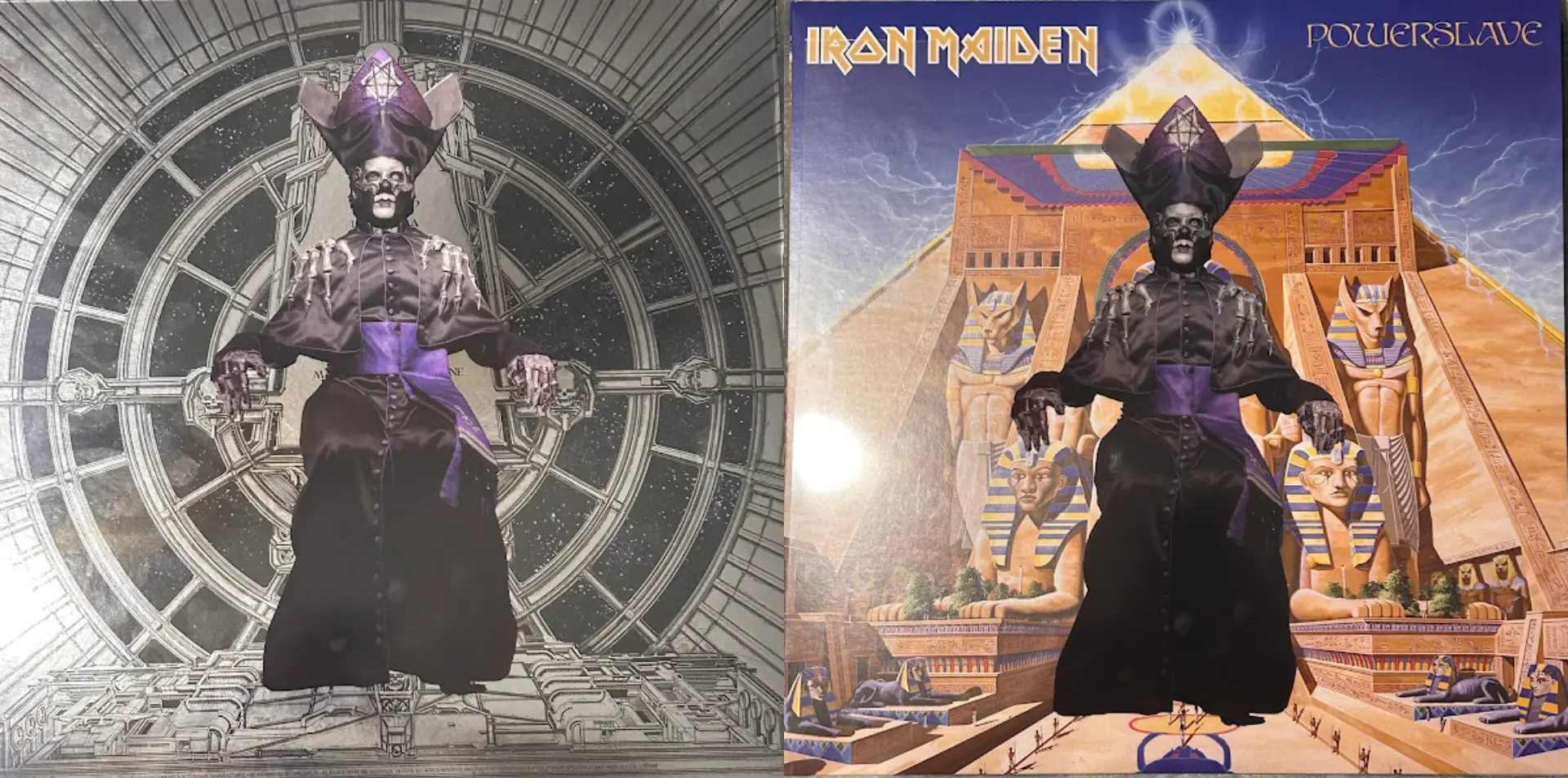
Due to harsh production values, most modern hard rock and metal albums hardly translate well on vinyl. Ghost’s albums sound exquisitely produced, lending themselves to benefit greatly within the grooves. Skeletá provides light and shade between moments of subtlety and bombast. A fine example is before the final chorus of “Peacefield,” where a synthesizer quietly plays out the chorus melody and gets accented by power chords that pop out of the speakers. The soundstage is full of depth and allows each mix component to ride comfortably without risk of being overpowered or drowned. Perhaps it lends to Ghost’s style, but the bottom end thrives on this pressing. The tight kick drum and percussive bass tone will bob your head during the album’s heavy hitters. Credit must be given to Tobias Forge for providing his best vocals on record to date. Compared to his borderline monotone delivery on Ghost’s debut, 2010’s Opus Eponymous, he finally lets loose with soaring highs and dramatic inflections. It allows the listener to not only be in awe of the exceptional instrumental arrangements but also get lost in the passion of the vocals.
Whereas Impera was about the rise and fall of empires and how it correlated to modern times, Tobias Forge intentionally made Skeletá Ghost’s most introspective record to date. A ten-track collection tackling concepts of hope, self-deceit, love, forbearance, regret, hate, toxicity, lust, and mortality are all universally felt human sentiments that not only the devoted Ghost fan can wrap around, but any fresh or casual listener can identify with.
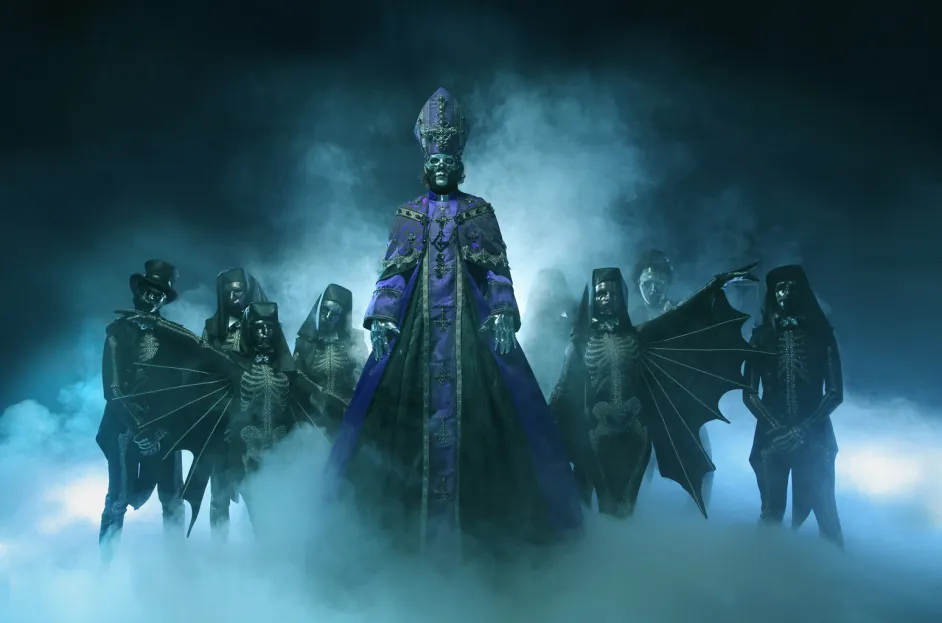



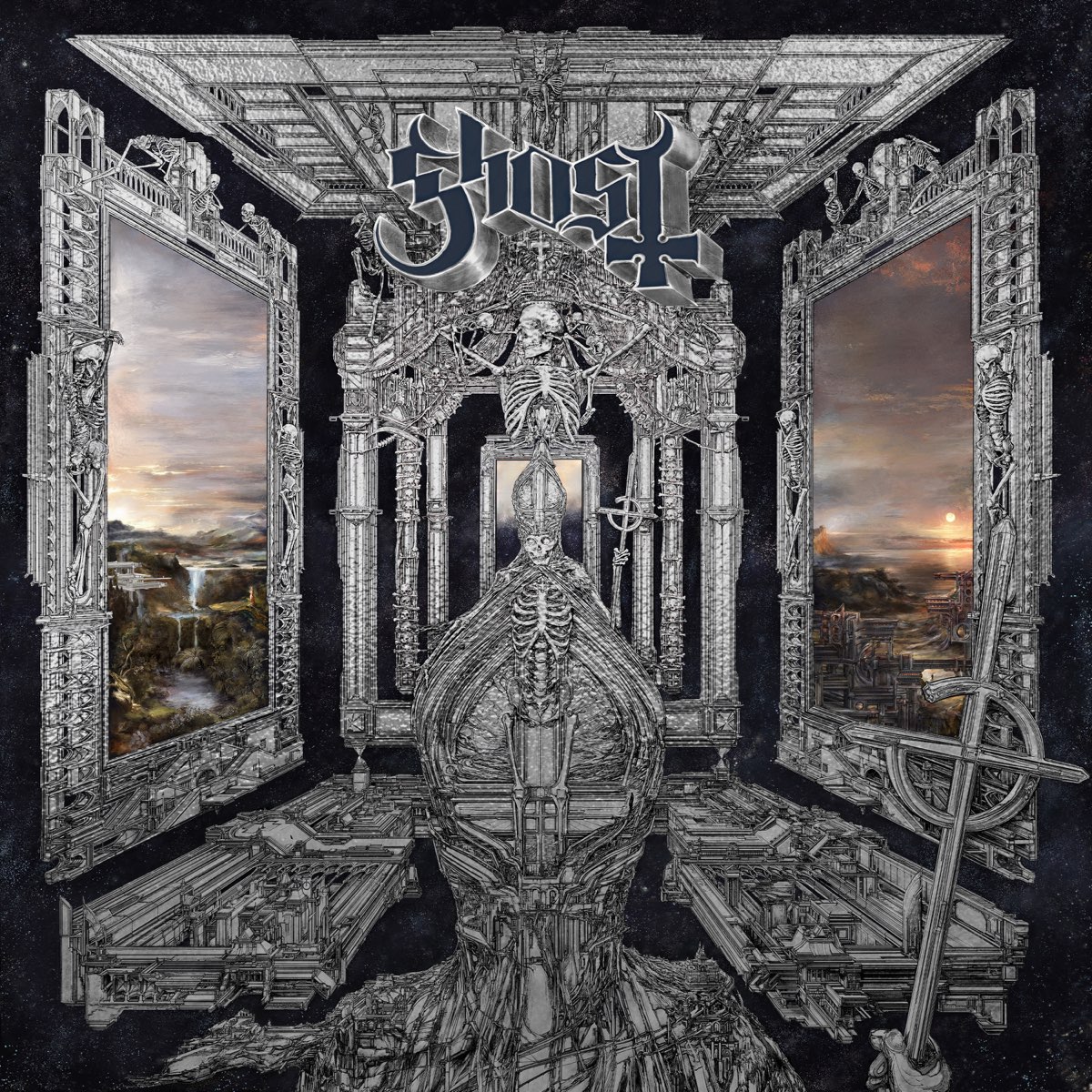




































.png)








